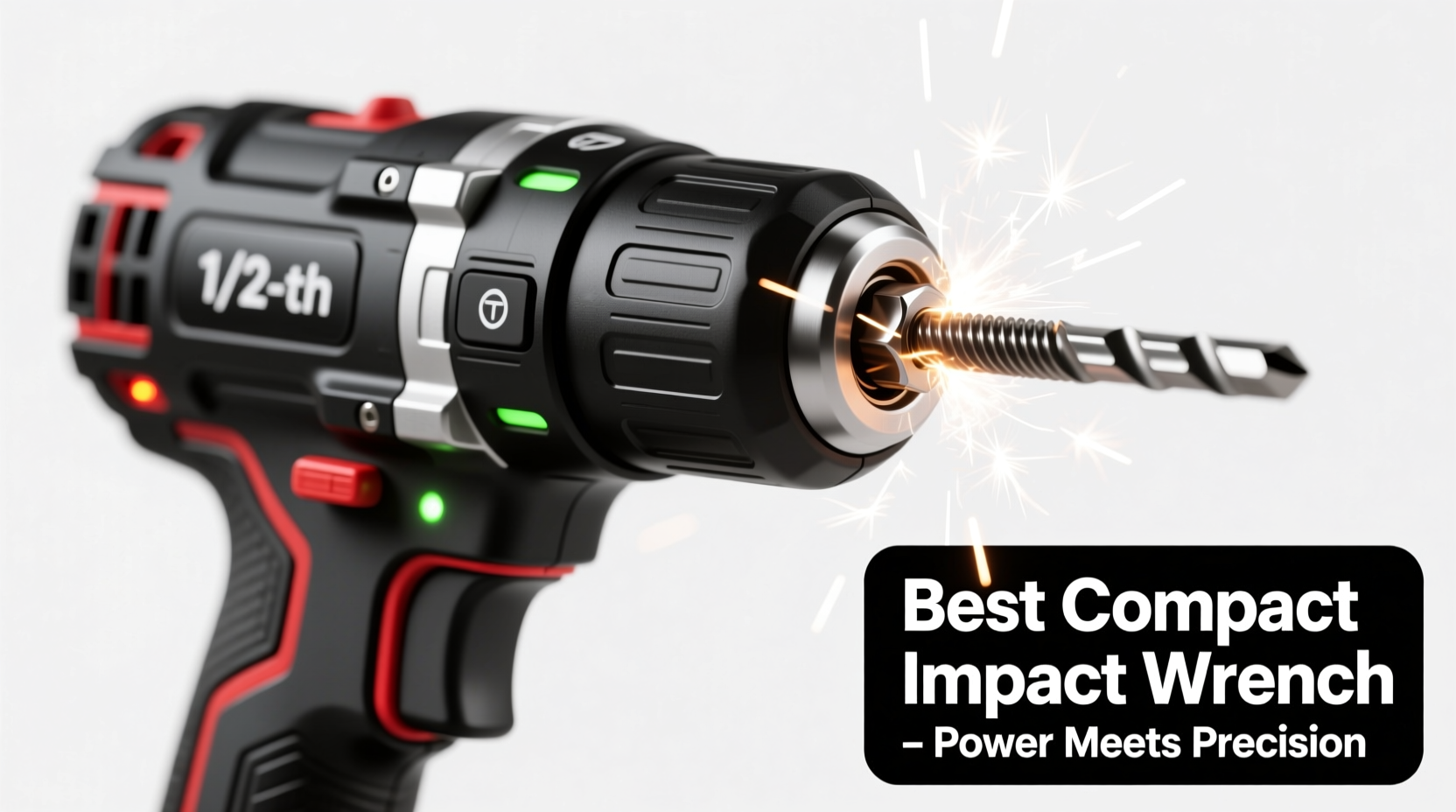When space is tight and torque demands are high, a compact impact wrench becomes an indispensable tool. Whether you're changing tires in a cramped garage, working under the hood of a modern vehicle, or tackling heavy-duty fasteners on a job site, having a powerful yet maneuverable impact wrench can make all the difference. Today’s market offers a wide range of compact models—especially cordless—that combine portability with impressive power. But not all tools deliver equal performance, durability, or user comfort. Choosing the right one requires understanding key features, trade-offs, and real-world usability.
Why Compact Impact Wrenches Are Gaining Popularity

The shift toward smaller, more efficient tools has been driven by advancements in battery technology and motor design. Lithium-ion batteries now provide higher voltage in smaller packages, enabling 18V (or 20V Max) tools to rival older, bulkier pneumatic models. Compact impact wrenches typically measure under 6 inches in length and weigh less than 3 pounds, making them ideal for overhead work, confined spaces, and extended use without fatigue.
Automotive technicians, DIY mechanics, and construction professionals increasingly favor these tools for their versatility. A compact impact wrench isn’t just for lug nuts—it handles suspension bolts, engine components, and even light framing tasks when paired with the right socket set.
“Modern compact impacts deliver over 300 ft-lbs of breakaway torque—enough to handle most automotive applications without sacrificing control.” — Mark Reynolds, Automotive Tool Specialist at ProGear Reviews
Key Features to Evaluate Before Buying
Selecting the best compact impact wrench means looking beyond advertised torque numbers. Real-world performance depends on several integrated factors:
- Torque Output: Measured in foot-pounds (ft-lbs), this indicates how much rotational force the tool can deliver. Look for models offering at least 250–350 ft-lbs of nut-busting torque.
- Drive Size: Most compact models use a 1/4-inch hex drive or 3/8-inch square drive. The former excels in precision tasks; the latter handles heavier fasteners.
- Battery Compatibility: Choose a model that aligns with your existing power ecosystem (e.g., DeWalt 20V MAX, Milwaukee M18, Makita LXT).
- Noise and Vibration Levels: Compact doesn’t mean quiet. Some models exceed 100 dB. Lower vibration improves control and reduces hand fatigue.
- Modes and Controls: Multiple speed/torque settings allow better fastener control, reducing the risk of over-tightening or damaging threads.
Top 5 Compact Impact Wrenches Compared
| Model | Max Torque (ft-lbs) | Drive Size | Voltage | Weight | Best For |
|---|---|---|---|---|---|
| Milwaukee M18 FUEL 2567 | 350 | 1/4\" Hex | 18V | 2.6 lbs | Professional mechanics, daily use |
| DeWalt DCF899HB-XE | 330 | 1/4\" Hex | 20V MAX | 2.8 lbs | Heavy-duty DIYers |
| Makita XWT11Z | 225 | 1/4\" Hex | 18V LXT | 2.4 lbs | Precision assembly work |
| Hilti TE 30-A36 | 300 | 3/8\" Square | 36V | 3.1 lbs | Industrial/construction |
| Ryobi P235A ONE+ | 200 | 1/4\" Hex | 18V | 2.2 lbs | Budget-conscious users |
The Milwaukee M18 FUEL stands out for its combination of power, efficiency, and REDLINK intelligence, which prevents overheating and optimizes performance. Meanwhile, the Hilti model offers unmatched durability for industrial environments but comes at a premium price. For homeowners, the Ryobi option delivers strong value if your tasks don’t require maximum torque.
Real-World Application: A Weekend Mechanic’s Experience
James, a weekend car enthusiast from Portland, recently upgraded from a full-size pneumatic impact to the DeWalt DCF899HB. He works primarily on his vintage truck in a small two-car garage without access to a large air compressor. “The compact size lets me reach behind the wheel well without removing panels,” he explains. “I was skeptical about the power, but it broke loose my rusted lug nuts with no issue. Plus, I used it to install new sway bar links—something I used to struggle with using hand tools.”
What impressed him most was the three-speed selector. “I can start slow to seat the bolt, then ramp up to final torque. It gives me confidence I’m not stripping anything.” His only caveat? “Don’t expect silence. It’s loud, but so is any tool that does real work.”
How to Choose the Right Model for Your Needs
Selecting the best compact impact wrench depends on your specific use case. Follow this step-by-step decision guide:
- Assess Your Typical Fastener Size: If you’re mostly dealing with 8mm–14mm bolts, a 1/4\" hex drive is sufficient. For larger automotive or structural fasteners, consider a 3/8\" model.
- Evaluate Battery Ecosystem: If you already own tools from a major brand, sticking with the same platform saves money and charging hassle.
- Determine Required Torque: Lug nuts typically require 80–120 ft-lbs of tightening torque, but breaking them loose—especially after corrosion—can demand 250+ ft-lbs.
- Test Ergonomics: Visit a hardware store if possible. A shorter front helps with clearance; a rubberized grip reduces slippage during high-torque bursts.
- Check Warranty and Support: Brands like Milwaukee and DeWalt offer 3–5 year warranties, signaling long-term reliability.
Common Mistakes to Avoid
- Using non-impact-rated sockets or extensions, risking breakage.
- Over-tightening fasteners due to lack of torque control—always use a torque wrench for final tightening.
- Ignoring battery health—older or low-charge batteries reduce performance significantly.
- Forgetting noise protection—many compact impacts exceed safe hearing levels during prolonged use.
Frequently Asked Questions
Can a compact impact wrench remove seized bolts?
Yes, many top-tier models generate enough breakaway torque (300+ ft-lbs) to loosen severely corroded or over-torqued bolts. Applying penetrating oil beforehand increases success and reduces strain on the tool.
Are brushless motors worth the extra cost?
Absolutely. Brushless motors adjust power based on load, improving efficiency, extending runtime, and increasing tool lifespan. They also run cooler and require less maintenance than brushed counterparts.
Is a 1/4\" hex drive too small for automotive work?
Not necessarily. While 3/8\" drives handle larger fasteners, modern 1/4\" hex impact wrenches are engineered for high torque output. Just ensure you’re using impact-rated bits and avoid using them on fasteners larger than 14mm consistently.
Final Recommendations and Action Plan
If professional-grade reliability is your priority, the Milwaukee M18 FUEL 2567 is the top overall choice. It balances compactness, intelligent electronics, and brute strength. For those invested in the DeWalt ecosystem, the DCF899HB offers comparable performance with excellent ergonomics. On a budget, Ryobi’s ONE+ system delivers surprising capability for occasional users.
Before purchasing, define your primary use case, check compatibility with your current batteries, and prioritize models with multiple torque/speed modes. Don’t overlook build quality—tools with forged aluminum housings and protective bumpers last longer in demanding conditions.
“The right compact impact isn’t just about power—it’s about control, consistency, and confidence in every turn.” — Lena Torres, Master Technician and Tool Instructor
Ready to Upgrade Your Toolkit?
Stop struggling with stubborn fasteners and limited workspace. The best compact impact wrench transforms frustrating jobs into quick, reliable tasks. Whether you're maintaining your vehicle, building furniture, or repairing equipment, investing in a high-performance compact model pays off in time saved, effort reduced, and results improved. Evaluate your needs, compare trusted models, and make the switch today. Your hands—and your projects—will thank you.









 浙公网安备
33010002000092号
浙公网安备
33010002000092号 浙B2-20120091-4
浙B2-20120091-4
Comments
No comments yet. Why don't you start the discussion?